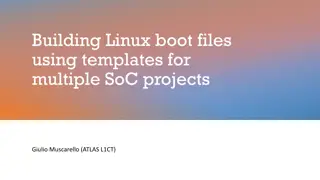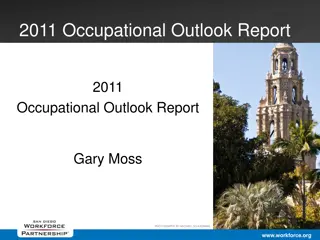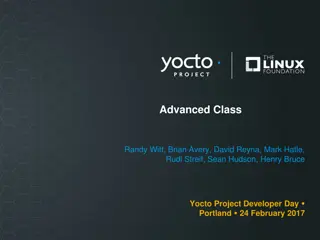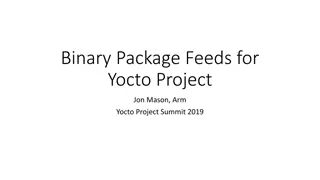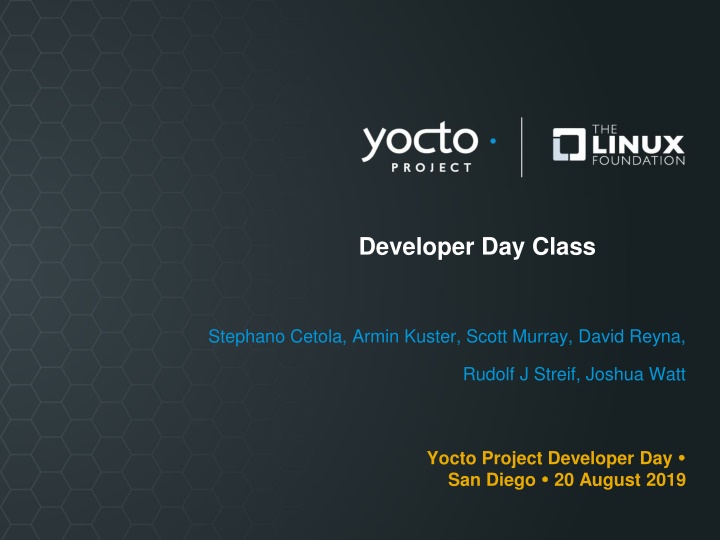
Yocto Project Developer Day Updates and Releases
"Get the latest updates from the Yocto Project Developer Day in San Diego, including keynotes, agenda highlights, and important announcements about upcoming releases. Discover the exciting developments in the Yocto Project, including new features, enhanced infrastructure, and community growth opportunities."
Download Presentation

Please find below an Image/Link to download the presentation.
The content on the website is provided AS IS for your information and personal use only. It may not be sold, licensed, or shared on other websites without obtaining consent from the author. If you encounter any issues during the download, it is possible that the publisher has removed the file from their server.
You are allowed to download the files provided on this website for personal or commercial use, subject to the condition that they are used lawfully. All files are the property of their respective owners.
The content on the website is provided AS IS for your information and personal use only. It may not be sold, licensed, or shared on other websites without obtaining consent from the author.
E N D
Presentation Transcript
Developer Day Class Stephano Cetola, Armin Kuster, Scott Murray, David Reyna, Rudolf J Streif, Joshua Watt Yocto Project Developer Day San Diego 20 August 2019
DevDay Class Class Content (download these slides!): https://wiki.yoctoproject.org/wiki/DevDay_San_Diego_2019 Lab Requirements: Wireless connection: same as ELCE conference SSH (Windows: e.g. putty ) Wireless Registration: Will be passed out 2
Agenda The Developer Day Class 9:00- 9:10 9:10- 9:15 9:15-10:15 10:15-10:30 10:30-12:00 12:00-12:30 12:30- 1:10 1:10- 1:40 1:40- 2:40 2:10- 2:30 2:30- 3:30 3:30- 4:30 4:30- 5:00 5:00- 5:30 Keynote Lab account setup Hash Equivalency/Runqueue Morning Break User Space Topics Lunch Package Feeds Mirrors and SState WIC Afternoon Break Container building/Multiconfig Devtool Tools, Toaster, User Experience Forum, Q and A 3
Activity One Keynote Nicolas Dechesne
Outline Yocto Project Dev Day Yocto Project updates Yocto Project Summit 2019 Yocto Project at ELC Join us! 5
Yocto Project Dev Day Very important event for us we really enjoy meeting new users we really value feedback from the field! Don t hesitate to ask questions, take as much as possible from the great speakers today! We need more users, contributors and maintainers! Send us feedback! 6
Yocto Project releases 2.6.1, 2.6.2, 2.6.3 ~600 changes 94 developers So far, for 3.0 ~1500 changes 136 developers 2.7 and 2.7.1 ~1900 changes 177 developers 7
Whats coming in 3.0 , aka zeus Autobuilder infrastructure hardware refreshed Many recipe updates, including significant removal of old or obsolete software to ensure modern and up-to-date core Linux software stack Support for the latest host distributions Pre-merge testing on IA and ARM using QEMU/KVM (ptest, LTP, tracking build performance) Build change equivalence is detected and used to avoid rebuilding unchanged components No other cross compiling build system is as complete or functional. Nobody has ever tried optimisations for from scratch builds like the Yocto Project does. 8
Live Coding with Yocto Project Monthly live tutorial on Twitch, run and managed by Josef Holzmayr, in collaboration with Yocto Project Advocacy and Community https://www.twitch.tv/yocto_project/ All videos available on our Youtube channel as well: https://www.youtube.com/user/TheYoctoProject 9
Yocto Project Summit 2019 First ever Yocto Project Summit 2019 Co-located with Embedded Linux Conference Europe, Lyon, France Oct 31st and Nov 1st 2019 Evening reception with drinks and appetizers. CFP is open until Sept 16th https://wiki.yoctoproject.org/wiki/index.php?title=Yoc to_Project_Summit_2019 10
Yocto Project at ELC (Wed) 11:35am Lightning Talk: Using Yocto to Deploy Digital Signage on an OpenWRT Wifi Router Alexander Sack Pantacor Ltd 3:15pm Migrating to Yocto: A Guide and Lessons Learned Muhammad Tauqir Ahmad & Ram Subramanian Cisco Meraki 4:20pm Sweeten your Yocto Build Times with Icecream Joshua Watt Garmin International 5:10pm Open Source CVE Monitoring and Management: Cutting Through the Vulnerability Storm Akshay Bhat Timesys 11
Yocto Project at ELC (Thu) 11:15am Understanding, Building and Researching Minimal (and not so minimal) Linux Systems Ron Munitz The PSCG 4:05pm FullMetalUpdate - A Fully Integrated Solution to Update Your IoT Devices Cedric Vincent Witekio 4:05pm Using Yocto to Build an IoT OS Targetting a Crossover SoC Ryan Fairfax Microsoft 4:55pm BoF: The Yocto Project and OpenEmbedded Nicolas Dechesne, Linaro & Armin Kuster, MontaVista Software, LLC 12
Yocto Project at ELC (Fri) 3:15pm Using Yocto as a Method to Upstream, Maintain, and Track Patches Jon Mason Arm 13
Join our community Use, participate, contribute! https://www.yoctoproject.org/community/ Public technical and engineering meetings Spread the work at conferences and events about the cool things you build with Yocto Project Social media: Stack overflow Twitter LinkedIn 14
Yocto Project Dev Day Lab Setup The virtual host s resources can be found here: Your Project: "/scratch/poky/build-qemuarm Extensible-SDK Install: "/scratch/sdk/qemuarm Sources: "/scratch/src Poky: "/scratch/poky" Downloads: "/scratch/downloads" Sstate-cache: "/scratch/sstate-cache You will be using SSH to communicate with your virtual server. 16
FYI: How class project was prepared (1/2) $ $ cd /scratch $ git clone -b warrior git://git.yoctoproject.org/poky.git $ cd poky $ $ bash # set up local shell $ # Prepare the project $ ./scratch/poky/oe-init-build-env build $ echo "MACHINE = \"qemuarm\"" >> conf/local.conf $ echo "SSTATE_DIR = \"/scratch/sstate-cache\"" >> conf/local.conf $ echo "DL_DIR = \"/scratch/downloads\"" >> conf/local.conf $ echo "IMAGE_INSTALL_append = \" gdbserver openssh libstdc++ \ curl \"" >> conf/local.conf $ $ # Build the project $ bitbake core-image-base $ 17
FYI: How class project was prepared (2/2) $ # Build the eSDK $ $ bitbake core-image-base -c populate_sdk_ext $ cd /scratch/poky/build/tmp/deploy/sdk/ $ ./poky-glibc-x86_64-core-image-base-armv5e-toolchain-ext-*.sh \ -y -d /scratch/sdk/qemuarm $ exit # return to clean shell $ $ $ bash # set up local shell $ cd /scratch/sdk/qemuarm $ . /scratch/sdk/qemuarm/environment-setup-armv5e-poky-linux-gnueabi $ devtool modify virtual/kernel $ exit # return to clean shell $ 18
NOTE: Clean Shells! We are going to do a lot of different exercises in different build projects, each with their own environments. To keep things sane, you should have a new clean shell for each exercise. There are two simple ways to do it: 1. Close your existing SSH connection and open a new one -- or 2. Do a bash before each exercise to get a new sub-shell, and exit at the end to remove it, in order to return to a pristine state. 19
Activity Two Hash Equivalency/Runqueue Joshua Watt
Outline 1. What is the Runqueue? 2. Traditional Runqueue Execution 3. What is the purpose of Hash Equivalence? 4. Runqueue Execution with Hash Equivalence Server 5. Signature Generation with Hash Equivalence Server 6. Live Demo 7. The Role of Reproducible Builds 8. Alternate Output Hash Methods 21
What is the Runqueue? The queue (tree) of tasks that bitbake will execute for a given build Records task dependencies Record task state (completed, ready to run, not ready) As tasks are executed bitbake marks them as complete 23
Traditional Runqueue Execution A:do_configure A:do_populate_sysroot taskhash: 111 taskhash: 222 B:do_configure B:do_populate_sysroot taskhash: 333 taskhash: 444 25
Traditional Runqueue Execution A:do_configure A:do_populate_sysroot A:do_populate_sysroot:222 taskhash: 111 taskhash: 222 B:do_configure B:do_populate_sysroot B:do_populate_sysroot:444 taskhash: 333 taskhash: 444 26
Traditional Runqueue Execution A:do_populate_sysroot_setscene A:do_populate_sysroot:222 taskhash: 222 B:do_configure B:do_populate_sysroot taskhash: 333 taskhash: 444 27
Traditional Runqueue Execution A:do_configure A:do_populate_sysroot A:do_populate_sysroot:222 taskhash: aaa taskhash: bbb B:do_configure B:do_populate_sysroot B:do_populate_sysroot:444 taskhash: ccc taskhash: ddd 28
What is the purpose of Hash Equivalence? Improve the reuse of sstate Reduce unnecessary rebuilds of recipes Reduce build times 29
Runqueue Execution with Hash Equivalence Server 30
Runqueue Execution with Hash Equivalence Server A:do_configure A:do_populate_sysroot A:do_populate_sysroot:222 taskhash: 111 unihash: 111 taskhash: 222 unihash: 222 Hash server B:do_configure B:do_populate_sysroot B:do_populate_sysroot:444 taskhash: 333 unihash: 333 taskhash: 444 unihash: 444 31
Runqueue Execution with Hash Equivalence Server A:do_configure A:do_populate_sysroot A:do_populate_sysroot:222 taskhash: 111 unihash: 111 taskhash: 222 unihash: 222 outhash: 123 Hash server outhash 123 = taskhash 222 B:do_configure B:do_populate_sysroot B:do_populate_sysroot:444 taskhash: 333 unihash: 333 taskhash: 444 unihash: 444 32
Runqueue Execution with Hash Equivalence Server A:do_configure A:do_populate_sysroot A:do_populate_sysroot:222 taskhash: aaa unihash: aaa taskhash: bbb unihash: bbb Hash server outhash 123 = taskhash 222 B:do_configure B:do_populate_sysroot B:do_populate_sysroot:444 taskhash: ccc unihash: ccc taskhash: ddd unihash: ddd 33
Runqueue Execution with Hash Equivalence Server A:do_configure A:do_populate_sysroot A:do_populate_sysroot:222 taskhash: aaa unihash: aaa taskhash: bbb unihash: 222 outhash: 123 Hash server outhash 123 = taskhash 222 outhash 123 = taskhash bbb B:do_configure B:do_populate_sysroot B:do_populate_sysroot:444 taskhash: ccc unihash: ccc taskhash: ddd unihash: ddd 34
Runqueue Execution with Hash Equivalence Server A:do_configure A:do_populate_sysroot A:do_populate_sysroot:222 taskhash: aaa unihash: aaa taskhash: bbb unihash: 222 Hash server outhash 123 = taskhash 222 outhash 123 = taskhash bbb B:do_configure B:do_populate_sysroot B:do_populate_sysroot:444 taskhash: 333 unihash: 333 taskhash: 444 unihash: 444 35
Runqueue Execution with Hash Equivalence Server A:do_configure A:do_populate_sysroot A:do_populate_sysroot:222 taskhash: aaa unihash: aaa taskhash: bbb unihash: 222 Hash server outhash 123 = taskhash 222 outhash 123 = taskhash bbb B:do_populate_sysroot_setscene B:do_populate_sysroot:444 taskhash: 444 unihash: 444 36
Signature Generation with Hash Equivalence Server 37
Signature Generation with Hash Equivalence Server A:do_configure A:do_populate_sysroot:222 taskhash: aaa unihash: aaa Hash server outhash 123 = taskhash 222 outhash 123 = taskhash bbb B:do_populate_sysroot:444 39
Signature Generation with Hash Equivalence Server A:do_configure A:do_populate_sysroot A:do_populate_sysroot:222 taskhash: aaa unihash: aaa taskhash: bbb unihash: bbb Hash server outhash 123 = taskhash 222 outhash 123 = taskhash bbb B:do_populate_sysroot:444 40
Signature Generation with Hash Equivalence Server A:do_configure A:do_populate_sysroot A:do_populate_sysroot:222 taskhash: aaa unihash: aaa taskhash: bbb unihash: 222 Hash server outhash 123 = taskhash 222 outhash 123 = taskhash bbb B:do_populate_sysroot:444 41
Signature Generation with Hash Equivalence Server A:do_configure A:do_populate_sysroot A:do_populate_sysroot:222 taskhash: aaa unihash: aaa taskhash: bbb unihash: 222 Hash server outhash 123 = taskhash 222 outhash 123 = taskhash bbb B:do_configure B:do_populate_sysroot B:do_populate_sysroot:444 taskhash: 333 unihash: 333 taskhash: 444 unihash: 444 42
Signature Generation with Hash Equivalence Server A:do_populate_sysroot_setscene A:do_populate_sysroot:222 taskhash: bbb unihash: 222 Hash server outhash 123 = taskhash 222 outhash 123 = taskhash bbb B:do_populate_sysroot_setscene B:do_populate_sysroot:444 taskhash: 444 unihash: 444 43
The Role of Reproducible Builds Hash equivalence and reproducible builds go together Better reproducibility means better hash equivalence 45
Alternative Output Hash Methods The output hashing method can be replaced Opportunity to implement context-sensitive hashes ELF Library Symbol hashing Scripting language specific hashing Locking hashes 46
Activity Three User Space Topics Rudi Streif
Overview Activity Setup Users, Groups and Passwords Login Shells Sudo Configuration SSH Server Configuration Please ask questions. Your questions might help others too. 48
Activity Setup Create an activity layer and add it to the build environment $ cd /scratch/poky $ source oe-init-build-env build $ bitbake-layers create-layer meta-activity3 NOTE: Starting bitbake server Add your new layer with bitbake-layers add-layer meta-activity3 $ bitbake-layers add-layer meta-activity3 NOTE: Starting bitbake server $ cat conf/bblayers.conf BBLAYERS ?= \ /scratch/poky/meta \ /scratch/poky/meta-poky \ /scratch/poky/meta-yocto-bsp \ /scratch/poky/build/meta-activity3 \ 49
Activity Setup Create an image recipe $ mkdir -p meta-activity3/recipes-core/images $ pushd meta-activity3/recipes-core/images $ vi core-image-activity3.bb SUMMARY = "Activity 3 Test Image" DESCRIPTION = "Activity 3 Test Image for Yocto Project DevDay" LICENSE = "MIT" IMAGE_INSTALL = "packagegroup-core-boot \ packagegroup-base-extended \ ${CORE_IMAGE_EXTRA_INSTALL} \ " inherit core-image $ bitbake core-image-activity3 $ runqemu qemuarm nographic 50
Users, Groups and Passwords The extrausers class provides a mechanism for managing users, groups and passwords. Available commands: useradd usermod userdel groupadd groupmod groupdel Commands are added to the EXTRA_USERS_PARAMS variable. Passwords must be provided in encrypted form. 51

![(❤Read⚡) [✔PDF✔] The Best Travel Guide - San Diego: A Cicerone’s View of To](/thumb/68088/read-pdf-the-best-travel-guide-san-diego-a-cicerone-s-view-of-to.jpg)
